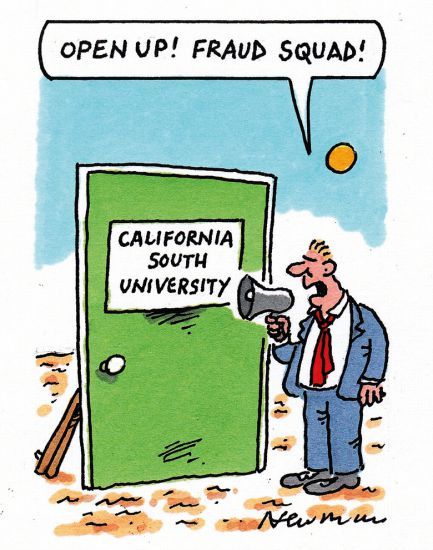
The University of Alberta is pushing to shut a fictitious online university that has stolen its identity, The Globe and Mail reported on 14 March. With its four sprawling campuses, 150 buildings, 39,000 students and 260,000 alumni, California South University seems to bear an uncanny resemblance to Alberta, the Toronto-based paper said. However, there are a couple of more glaring warning signs, with California South claiming that its current head is Canada’s prime minister Justin Trudeau and bizarrely stating that one of its professors is the “president of the National Hockey League…who was once a referee who made a controversial call in a game played by the Los Angeles Maple Leafs”. “That is all pretty heady stuff for an institution with a listed address in Irvine that turns out to be a two-storey house,” a California academic who stumbled across the site told The Globe and Mail. But he added: “They are trying to con people into sending them money – it is fairly elaborate, and it’s fraud.”
The Advertising Standards Authority has upheld a complaint about an online essay mill in the first ruling of its kind. On its website, UK Essays claims to provide a “guaranteed grade, every time” with its ghostwritten papers, and features quotes on its services from sources including the BBC, The Guardian and the Daily Mail. In a complaint to the ASA, the Quality Assurance Agency complained that the website “does not make sufficiently clear the risks associated with submitting purchased essays” and misleadingly implies that UK Essays “has received positive coverage or endorsement from those press outlets”. In a ruling published on 21 March, the ASA upheld both challenges and said that the claims must not appear in their current form again. “Essay mills mislead students and put their academic and professional careers at risk,” said Ian Kimber, the QAA’s director of academic standards. “This landmark ruling by [the] ASA is the first successful challenge to their claims of legitimacy, exposing their cynical use of anti-plagiarism disclaimers and exploitative media referencing.”
Students from lesbian, gay, bisexual and queer backgrounds are more likely to abandon science majors in US universities than their heterosexual peers, research reveals. Bryce Hughes, an education researcher at Montana State University, analysed data on more than 4,000 students at 78 higher education institutions and found that LGBQ students were 8 per cent less likely to stay in a science, technology, engineering or mathematics major than their straight classmates. This gap rose to nearly 10 per cent when a subset of students considered more likely to stay in a STEM field, for example because they had good grades, was considered, according to a paper published in Science Advances on 14 March. Although the study did not examine why LGBQ students were more likely to drop STEM majors, Michael Falk, vice-dean for undergraduate education at Johns Hopkins University, told Nature that it was “highly likely” that marginalisation and isolation played a part.
Two UK-based academics and their 11-year-old daughter face deportation after the Home Office said that they had spent too long conducting fieldwork abroad. Ernesto Schwartz-Marín, an anthropology researcher at Durham University, and his wife, Arely Cruz-Santiago, a postgraduate researcher in the university’s geography department, were told by the Home Office that their family has 14 days to leave the UK. The Mexican-born couple, who moved to the UK more than a decade ago, spent 270 days working with victims of gang violence in Mexico, using their expertise to build a DNA database to help locate the missing. Home Office guidelines state that non-European Union migrants cannot spend more than 180 days outside the UK during their visa period unless they are “attending to a national or international humanitarian or environmental crisis”.
Many scientists have a story to tell about Stephen Hawking, the cosmologist whose scientific achievements in the face of great physical adversity captured the world’s imagination, and who died on 14 March, aged 76. A dive into the Times Higher Education archives reveals a 2006 article about the experiences of the University of Cambridge professor’s graduate assistants, including one, Julian Luttrell, who described how his boss could “get very, very angry very quickly, and that is not a pretty sight”. It might be hard to imagine Professor Hawking, whose motor neurone disease confined him to a wheelchair, being capable of physical intimidation. But Dr Luttrell said: “He has been known to run over your feet in his wheelchair in fury.”